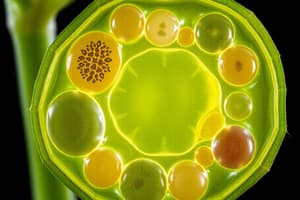Podcast
Questions and Answers
What is the function of the cell wall?
What is the function of the cell wall?
Supports and protects the cell, controls what goes in and out of the cell
Which organelles are found in both plant and animal cells?
Which organelles are found in both plant and animal cells?
Nucleus, Cell Membrane, Cytoplasm
Name two organelles found in plant cells but not animal cells.
Name two organelles found in plant cells but not animal cells.
Chloroplast, Cell Wall
What is the function of the nucleus?
What is the function of the nucleus?
Explain the function of the mitochondrion.
Explain the function of the mitochondrion.
How does the structure of plant cells differ from animal cells?
How does the structure of plant cells differ from animal cells?
What is the primary function of the cell membrane?
What is the primary function of the cell membrane?
Describe the function of the vacuole in plant cells.
Describe the function of the vacuole in plant cells.
Why are cells described as the building blocks of all living things?
Why are cells described as the building blocks of all living things?
What gives plant cells their fixed, rectangular shape?
What gives plant cells their fixed, rectangular shape?
Flashcards
Sensitivity
Sensitivity
The ability of an organism to detect and respond to changes in its environment.
Reproduction
Reproduction
The process by which living organisms create new individuals of the same kind.
Respiration
Respiration
The process by which energy is released from food. This is not the same as breathing.
Cell
Cell
Signup and view all the flashcards
Cytoplasm
Cytoplasm
Signup and view all the flashcards
Nucleus
Nucleus
Signup and view all the flashcards
Cell membrane
Cell membrane
Signup and view all the flashcards
Mitochondria
Mitochondria
Signup and view all the flashcards
Cell wall
Cell wall
Signup and view all the flashcards
Vacuole
Vacuole
Signup and view all the flashcards
Study Notes
Characteristics of Living Things
- Living organisms exhibit characteristics such as movement, reproduction, respiration, excretion, nutrition, and responding to stimuli.
- Movement involves a change in position in a whole organism or part of an organism.
- Reproduction is the process by which living organisms create new individuals of the same kind as themselves.
- Sensitivity, or responding to stimuli, is the ability of an organism to pick up and respond to changes in their internal or external environment.
- Growth involves a permanent increase in size and complexity.
- Respiration is the process by which energy is released from food, and is not the same as breathing.
- Excretion is the removal of metabolic waste from the body.
- Nutrition is the process by which organisms obtain or make food.
What is a Cell?
- A cell is the basic building block of all living things.
- It is the smallest unit that can live on its own and makes up all living organisms and the tissues of the body.
Parts of a Cell
- Each cell is made up of structures that may differ from one cell to another depending on the function of that cell within the living system.
- There are four major structures or organelles common to all cells.
Animal Cell
- The animal cell is made up of:
- Cytoplasm, a jelly-like substance that makes up most of the cell, contains 80% water and 20% dissolved substances, and is the site of many chemical reactions.
- Nucleus, the "brain" of the cell, controls everything that the cell does and how it develops, and contains structures made up of DNA called chromosomes.
- Cell membrane, a very thin layer that forms a boundary around the cell, is selectively permeable, and allows some things to move in and out of the cell.
- Mitochondria, the "powerhouses" of the cell, produce the energy needed by the cell during respiration.
- Vacuole, small compartments surrounded by a membrane, may contain water, food, or waste.
Plant Cell
- The plant cell is made up of:
- Cell wall, a rigid structure made from a material called cellulose, supports and protects the cell, and gives the cell shape.
- Vacuole, a large central vacuole that contains liquid called cell sap, which contains dissolved substances such as glucose, minerals, amino acids, and waste products.
- Chloroplast, a disc-shaped structure that contains green pigment called chlorophyll, where photosynthesis occurs.
Studying That Suits You
Use AI to generate personalized quizzes and flashcards to suit your learning preferences.



